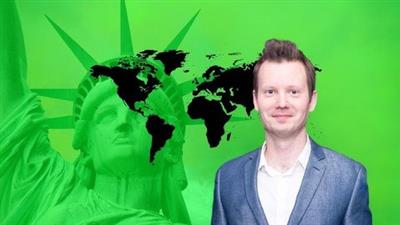
International Relations Theory: Liberalism
Last updated 10/2023
MP4 | Video: h264, 1280x720 | Audio: AAC, 44.1 KHz
Language: English | Size: 2.87 GB | Duration: 4h 18m
Learn liberalism: university-level, all key authors, human rights, democratic peace, institutions, soft power, examples!
What you'll learn
Think and speak about world problems through the lens of the oldest progressive theory of International Relations
Identify and understand the ideas of the founders of liberalism, including John Locke, David Hume, Hugo Grotius and Immanuel Kant
Become an expert on modern liberalist thinkers, including Norman Angell, Woodrow Wilson, Robert Keohane, Joseph Nye, Francis Fukuyama
Understand the differences between classical liberalism and neoliberalism
Understand the differences between neoliberalism and neorealism
Recognise how the liberal principle of human rights has its roots in the philosophy of John Locke and David Hume
Understand how the idea of international law dates back to Hugo Grotius
Understand why Immanuel Kant is so important for the liberal idea of international peace
Become an expert on Norman Angell - the Nobel Peace Prize laureate for his work on war and international institutions
Understand why Woodrow Wilson is the most important historical figure for the liberal International Relations theory
Identify the key elements in Robert Keohane's neoliberal programme of studying international organisations
Understand the difference between absolute gains and relative gains
Understand why Fukuyama proclaimed the 'end of history' in 1989, what he meant and whether he was right
Identify the key elements and real world examples of international regimes
Become an expert on Joseph Nye's concept of soft power and smart power
Understand democratic peace theory - a key modern liberal research programme
Understand the liberalist perspective on European integration and the European Union
Understand the liberalist perspective on the United Nations
Understand the liberalist perspective on the Responsibility to Protect (R2P)
Learn 6 practical tips for incorporating liberalism into your academic essays and dissertations
Requirements
The course is designed for all study levels and therefore does not require prior education in Politics or International Relations.
No upfront reading is necessary. In the course, students will learn about some of the most influential books on each topic.
For convenience, handouts for each lecture are provided and can be downloaded.
Description
In this course, you will get in-depth knowledge and understanding of key liberalist thinkers, theories and concepts, including real world examples and even tips for writing essays and dissertations.The course will give you confidence to think and speak about world problems through the lens of the oldest and highly influential progressive theory of International Relations.If you are interested in world politics, chances are you are reading and watching quite a bit of news about what's going on. That's OK, but there is nothing more rewarding that actually educating yourself to improve the depth and breadth of your knowledge and understanding of how the world works.My courses are designed to help you with that objective and this course offers you complete knowledge and understanding of the most exciting progressive theory of International Relations.How You Will LearnIt is my philosophy in this course to allow the thinkers and authors speak for themselves. I want to give them the voice. At the same time, I offer you my full explanation and interpretation of every quote we analyse in the course. I don't just leave you there wondering what this all means.We will begin with classical liberalist thinkers and the founders of liberal international thought: Locke, Hume, Grotius and Kant. Then, we will move to 20th century to explore the tenets of classical liberalist International Relations theory, followed by neoliberal intergovernmentalism (also known as institutionalism). We will also explore liberalism since the 1990s, including focus on:the end of historysoft powersmart powerinternational regimesdemocratic peace theoryThe bonus lecture will give you 6 practical tips for incorporating liberalism into writing your academic essays and dissertations. As much as talking about theories is interesting in itself, I also believe in the value of practical examples. So in this course, we discuss three case studies of how liberalism can be applied to analyse real world problems. These include: the liberalist perspective on European integration and the European Union, United Nations and the Responsibility to Protect (R2P). What You Will Get in This CourseHere is a summary of what you will learn in this course:Think and speak about world problems through the lens of the oldest progressive theory of International RelationsIdentify and understand the ideas of the founders of liberalism, including John Locke, David Hume, Hugo Grotius and Immanuel KantBecome an expert on modern liberalist thinkers, including Norman Angell, Woodrow Wilson, Robert Keohane, Joseph Nye, Francis FukuyamaUnderstand the differences between classical liberalism and neoliberalismUnderstand the differences between neoliberalism and neorealismRecognise how the liberal principle of human rights has its roots in the philosophy of John Locke and David HumeUnderstand how the idea of international law dates back to Hugo GrotiusUnderstand why Immanuel Kant is so important for the liberal idea of international peaceBecome an expert on Norman Angell - the Nobel Peace Prize laureate for his work on war and international institutionsUnderstand why Woodrow Wilson is the most important historical figure for the liberal International Relations theoryIdentify the key elements in Robert Keohane's neoliberal programme of studying international organisationsUnderstand the difference between absolute gains and relative gainsUnderstand why Fukuyama proclaimed the 'end of history' in 1989, what he meant and whether he was rightIdentify the key elements and real world examples of international regimesBecome an expert on Joseph Nye's concept of soft power and smart powerUnderstand democratic peace theory - a key modern liberal research programmeUnderstand the liberalist perspective on European integration and the European UnionUnderstand the liberalist perspective on the United NationsUnderstand the liberalist perspective on the Responsibility to Protect (R2P)Learn 6 practical tips for incorporating liberalism into your academic essays and dissertationsMy Promise to YouI promise that the tuition in this course is of the highest quality, based on genuine university-level teaching and research. It is presented in a highly-accessible and engaging way, designed specifically for those who do not have prior university degree in Politics or International Relations.I invite you to send me a message if you have any questions about the content of this course. With the 30-day 100% money back guarantee, there is no reason why you should not try the course out right now.
Overview
Section 1: Full List of My Courses
Lecture 1 Full List of My Courses
Section 2: Introduction to the Course
Lecture 2 Why Liberalism?
Lecture 3 What Will You Learn?
Lecture 4 How Will You Learn?
Lecture 5 About the Author
Section 3: Locke and Hume: The Foundations of Liberalism
Lecture 6 State of Nature and Law of Nature (1)
Lecture 7 State of Nature and Law of Nature (2)
Lecture 8 Locke and IR liberalism
Lecture 9 Hume on Laws of Nations
Lecture 10 Hume on Laws of Nature
Lecture 11 Hume and IR Liberalism
Section 4: Grotius: International Law
Lecture 12 On the Law of War and Peace
Lecture 13 Why Writing On the Law of War and Peace?
Lecture 14 On the Law of Nature
Lecture 15 On the Law of Nature and Natural Rights
Lecture 16 Grotius and Thirty Years War
Lecture 17 The Nature of Natural Law
Lecture 18 Grotius and IR Liberalism
Section 5: Kant: International Peace
Lecture 19 Perpetual Peace: Preliminary Articles (1)
Lecture 20 Perpetual Peace: Preliminary Articles (2)
Lecture 21 On Republican Constitution
Lecture 22 On a Federation of Free States
Lecture 23 On World Citizenship
Lecture 24 On State of Nature
Lecture 25 Kant on Democratic Peace
Section 6: Angell and Wilson: International Institutions
Lecture 26 Angell on International Anarchy
Lecture 27 Angell on the Great Illusion
Lecture 28 Angell on Anarchy and International Security
Lecture 29 Angell on International Institutions
Lecture 30 Wilson's Fourteen Points (1)
Lecture 31 Wilson's Fourteen Points (2)
Lecture 32 The Liberalism of Woodrow Wilson
Lecture 33 Carr's Criticism of Liberalism
Section 7: Keohane and Nye: Neoliberal institutionalism
Lecture 34 Complex Interdependence (1)
Lecture 35 Complex Interdependence (2)
Lecture 36 Complex Interdependence (3)
Lecture 37 International Institutions
Lecture 38 Absolute and Relative Gains
Lecture 39 International Institutions: Bargaining
Lecture 40 International Institutions: Defection
Lecture 41 International Institutions: Autonomy
Lecture 42 Neoliberalism vs. Neorealism
Section 8: Modern liberalism in International Relations
Lecture 43 International Regimes: Definition
Lecture 44 International Regimes: Examples
Lecture 45 International Regimes: Perspectives
Lecture 46 Fukuyama: The End of History
Lecture 47 Fukuyama: Did the History End?
Lecture 48 Nye: Soft Power
Lecture 49 Nye: Smart Power
Lecture 50 Democratic Peace Theory
Section 9: Liberalism and Contemporary World Politics
Lecture 51 European Integration
Lecture 52 United Nations
Lecture 53 Responsibility to Protect (R2P)
Section 10: Bonus: Essays and Dissertations
Lecture 54 6 Tips for Writing Essays and Dissertations
Lecture 55 Bonus Lecture: Discount Coupons
Individuals interested in International Relations and the problems of international politics.,Students of Politics and International Relations who want to consolidate their knowledge and improve their grades.,Commentators, bloggers and journalists covering international politics.,Policy practitioners who want to improve their analytical skills and better understand the context of their policy activities.
Screenshots

Download link
rapidgator.net:
https://rapidgator.net/file/9f374528c8ccb096be3b98ab048490f4/tcvmf.International.Relations.Theory.Liberalism.part1.rar.html https://rapidgator.net/file/36623ece8adb8d6b0e7db4184d5c180f/tcvmf.International.Relations.Theory.Liberalism.part2.rar.html https://rapidgator.net/file/113a5b5e9242d00cd41e4ac727ee6802/tcvmf.International.Relations.Theory.Liberalism.part3.rar.html
uploadgig.com:
https://uploadgig.com/file/download/a28911f7499fEa33/tcvmf.International.Relations.Theory.Liberalism.part1.rar https://uploadgig.com/file/download/2b95fd11F5A6a24a/tcvmf.International.Relations.Theory.Liberalism.part2.rar https://uploadgig.com/file/download/567c4c62f7d8b7cd/tcvmf.International.Relations.Theory.Liberalism.part3.rar
ddownload.com:
https://ddownload.com/h1pf480t2zng/tcvmf.International.Relations.Theory.Liberalism.part1.rar https://ddownload.com/74lc14517n7i/tcvmf.International.Relations.Theory.Liberalism.part2.rar https://ddownload.com/w72orwq9u0p9/tcvmf.International.Relations.Theory.Liberalism.part3.rar